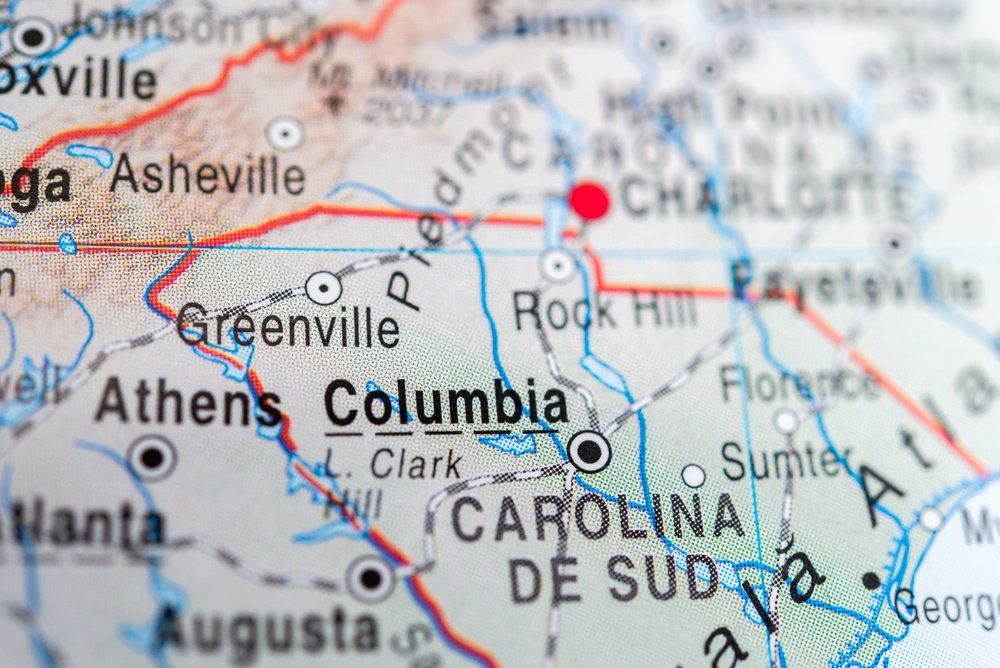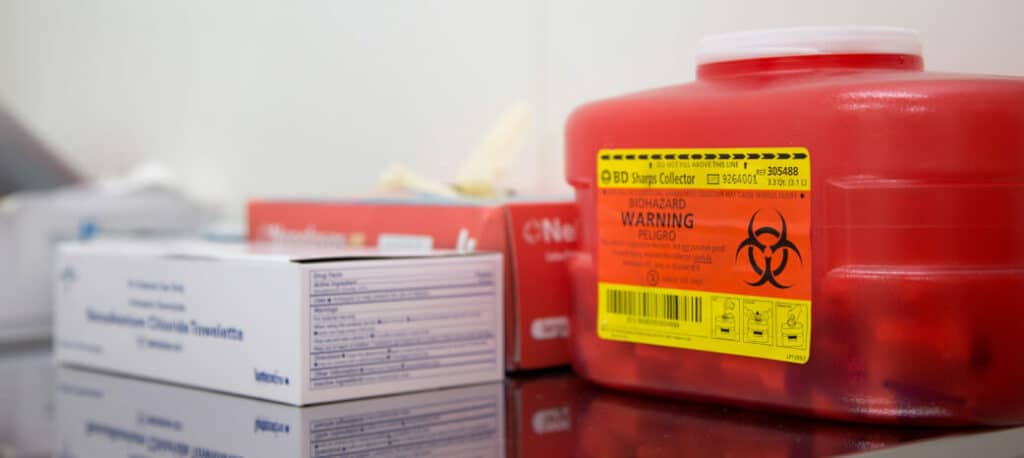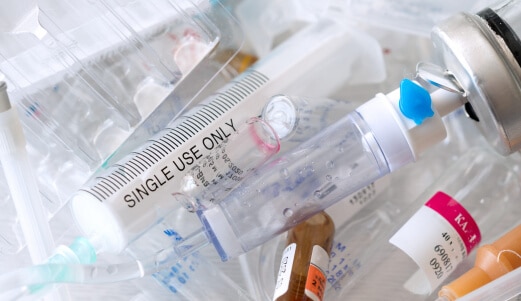
South Carolina Medical Waste Disposal
Annual Savings offered by MedPro Disposal in South Carolina
See below for some of our South Carolina quotes, saving South Carolina Practices thousands of dollars.
The MedPro Disposal Difference
Safe medical waste disposal has never been so simple and affordable. How do we keep our prices so low? By charging only for the services you need and keeping our operating costs low to pass along the savings.
Every practice is different, and we tailor a custom solution that fits your needs and budget, from our pick-up schedule to the right kinds of biohazard and sharps containers.
Find out how much you can save instantly. Try our online savings calculator.
South Carolina Locations Serviced
We offer biohazard and medical waste disposal services throughout South Carolina, including:
It’s Easy to Get Started With MedPro Disposal

Contact Us
Contact MedPro Disposal for a fast, free medical waste removal quote. We’ll get to know you, discuss your needs, and settle on a number. You may be surprised at how much you can save on medical waste disposal with MedPro Disposal.

Waste Pickup Date
Work with MedPro Disposal to determine your first pickup date. We’ll confirm your office hours and provide convenient options for medical waste and sharps pickup.

Compliance Survey
Complete a compliance survey. After we get to know your requirements, we’ll send you a survey to identify any areas that need to be brought up to OSHA standards.
All three steps occur at no additional cost to your practice. You’re on your way to safe, affordable, compliant medical waste removal!
Contact MedPro Disposal Today for a Fast, Free Quote!
South Carolina Medical Waste Savings
| Practice Type | Zip Code | Projected Annual Savings |
|---|---|---|
| OBGYN | 29801 | $2,801 |
| Optometrist | 29801 | $535 |
| Pediatrics | 29412 | $2,190 |
| Surgery Center | 29201 | $1,200 |
| Family Practice | 29203 | $7,265 |
| Orthopedics | 29223 | $300 |
Find Out How Much You Can Save Instantly
Try our on-line savings calculator.


South Carolina and adventure go hand in hand. Golf, hiking, fishing, and beach walking are among the state’s top outdoor draws, while its cities and towns woo visitors and residents alike with unmatched southern charm. MedPro is committed to keeping this beautiful state clean with South Carolina medical waste disposal.
A series of islands dotting the eastern coast lure sand and wave seekers, a number of civil war forts attract history buffs, and the mountains in the west provide hikers, climbers, bikers and all kinds of adrenaline junkies plenty of opportunity to get out and explore.
Though it’s one of the nation’s smallest states by land area, ranked number 40, it’s right in the middle when it comes to population with just shy of five million people living within its borders.
Here are just a few areas in South Carolina worth checking out:
Charleston is chock full of noteworthy sites. The city routinely appears on top 10 lists for best and most visited city in the entire nation. It’s a beachside city packed with class. Downtown Charleston is full of upper echelon restaurants and bed and breakfasts. Dubbed the “cultural capital of the south” Charleston has seen era after era of American history unfold in its midst. Historic buildings still stand, providing visitors insight into pre- and post- Civil War era South Carolina. It’s a town that is so proud of its natural and structural beauty that it goes to the utmost lengths to preserve it.
Myrtle Beach is a popular destination spot for people of all ages and walks of life, from families to spring breakers and everyone in between. Its hot summers and mild winters make it a great warm weather destination, while its nationally acclaimed boardwalk provides plenty of entertainment for all.
Unlike its large coastal cities, South Carolina’s capitol is nestled right in the middle of the state. The University of South Carolina took root in this city before the Civil War and has been attracting students in all fields of study ever since. Columbia is where big city meets college town and historical landmarks meet a modern skyline. Centrally located between mountains and beach, Columbia has something for everyone to enjoy.
Working in South Carolina

Many South Carolina transplants choose to come to the state because of the companies that have chosen to set up shop there. Manufacturing is a main driver for South Carolina’s economy. BMW built its only assembly plant in North American here in 1994 and Boeing brought part of its business to the state in 2009.
Just as South Carolina is a hub for manufacturing, it’s also a center for innovation. Fueled largely by the state’s colleges and Universities, there is groundbreaking research happening all over the state every day. Clemson University has an entire campus dedicated to automotive innovation and the University of South Carolina NanoCenter is known for its research in high-tech.
Healthcare in South Carolina
Healthcare combined with education workers makeup up 7% of South Carolina’s total workforce according to the South Carolina Department of Commerce. Though it’s a small slice compared to the 18% of the population employed in manufacturing or 18% employed in finance, insurance real estate, it’s an important slice
The Medical University of South Carolina is one of the state’s leaders in medical research and patient care. The University graduates students in a variety of medical specialties, from pediatrics to dentistry to research. As an active center for medical and biological research, and place that trains up the next generation of doctors, nurses and medical professionals, the Medical University of South Carolina is one of the state’s most treasured healthcare resources.
South Carolina Medical Waste Disposal
Medical and biohazard waste can come in a variety of different forms. South Carolina medical waste disposal is regulated by the Department of Health and Environmental Control. The Department has a strict set of rules and regulations that dictate how medical facilities handle South Carolina medical waste disposal. The regulations exist to protect the environment and the humans who may come into contact with that waste. Examples of medical waste include but is not limited to:
- Biohazard waste
- Body fluid
- Human blood
- Animal blood
- Used sharps and syringes
- Used bandages
- Used gloves
- Paper towels and other items used to clean
Where there Are Doctors…
Where there are doctors, there is medical waste; it’s a fact of life. One of the less glamorous things that medical professionals like those that come out of the Medical University of South Carolina, is how to properly dispose of the waste that they inevitably acquire during patient visits.
How to Do Proper South Carolina Medical Waste Disposal:
In South Carolina, there are around 7,000 registered facilities that generate infections waste, but only a handful of companies that are approved to take that waste from the office to its final resting place. MedPro Disposal is one of those medical waste disposal companies.
What are the Benefits to Using MedPro Disposal?
Price: MedPro Disposal has a proven track record of working with its clients to develop a pickup routine that fits into the client’s schedule and budget. With an army of approved drivers, MedPro Disposal is able to send someone out to pick up medical waste when a facility’s containers are likely to be full. Scheduling pickups too close together is ineffective and as a result, costly. But scheduling pickups too far apart can result in disaster. MedPro Disposal customizes pick up plans in order to cater to each individual clients’ needs.
Customer Service: MedPro Disposal only sends out the best of the best. Each of its employees is trained to work with the client’s best interest in mind. This means, if an extra stop needs to be scheduled, or a scheduled pickup needs to be postponed, making that change is only one phone call away.
Experience: MedPro Disposal is now available in 44 states across the nation. Its expansion over the past several years is a direct result of its good rapport with clients. Whether the customer is a doctor’s office, veterinary clinic, or dentist office, MedPro Disposal has experience working with all types. The company touts itself as one that knows the ins and outs of every regulation outlined by the Department of Health, and follows those regulations to the letter.
South Carolina EPA State Definitions
Classifications of Waste
An infectious waste is any used material which is: generated in the health care community in the diagnosis, treatment, immunization, or care of human beings; generated in embalming, autopsy, or necropsy; generated in research pertaining to the production of biologicals which have been exposed to human pathogens; generated in research using human pathogens; and which is not excluded in (2) below and which is listed in the categories below:
- Sharps. Any discarded article that may cause puncture or cuts, including but not limited to: needles, syringes, Pasteur pipettes, lancets, broken glass or other materials, and scalpel blades.
- Microbiologicals. Specimens, cultures, and stocks of human pathogenic agents, including but not limited to: waste which has been exposed to human pathogens in the production of biologicals; discarded live and attenuated vaccines; and discarded culture dishes/devices used to transfer, inoculate, and mix microbiological cultures.
- Blood and Blood Products. All waste unabsorbed human blood, or blood products, or absorbed blood when the absorbent is supersaturated, including but not limited to: serum, plasma and other components of blood, and visibly bloody body fluids such as suctioned fluids, excretions, and secretions.
- Pathological Waste. All tissues, organs, limbs, products of conception, and other body parts removed from the whole body, excluding tissues which have been preserved with formaldehyde or other approved preserving agents, and the body fluids which may be infectious due to bloodborne pathogens. These body fluids are: cerebrospinal fluids, synovial fluid, pleural fluid, peritoneal fluid, pericardial fluid, amniotic fluid, semen, and vaginal/cervical secretions.
- Contaminated Animal Waste. Animal carcasses, body parts and bedding when the animal has been intentionally exposed to human pathogens in research or the production of biologicals.
- Isolation Waste. All waste generated from communicable disease isolation of the Biosafety Level 4 agents, highly communicable diseases, pursuant to the `Guidelines for Isolation Precautions in Hospitals’, published by the Centers For Disease Control.
- Other Waste. Any other material designated by written generator policy as infectious, or any other material designated by a generator as infectious by placing the material into a container labeled infectious as outlined in Section J. Any solid waste which is mixed with infectious waste becomes designated as infectious and must be so managed unless expressly excluded in 2 below.
- Infectious Waste Residues Resulting from Discharges.
Types of Wastes
Sharps. cultures and stocks of infectious agents and associated biologicals. human blood and blood products. pathological waste. contaminated animal carcasses, body parts, and bedding of animals intentionally exposed to pathogens. and isolation waste pursuant to the “Guidelines for Isolation Precautions in Hospitals”, Centers for Disease Control.
Storage Requirements
- Storage of infectious waste must be in such a manner and location which affords protection from animals and weather conditions and which minimize exposure to the public.
- Infectious waste must be segregated from other waste at the point of origin and maintained in separate containers until it is treated.
- Infectious waste must be contained in approved disposable or reusable containers that are appropriate for the type and quantity of waste, must withstand handling, transfer, and transportation without impairing the integrity of the container, must be closed tightly and secured, and are compatible with selected storage and treatment processes.
- Sharps must be contained in rigid, puncture-resistant containers which are secured tightly to preclude loss of the contents.
- Containers of infectious waste must be labeled properly, clearly identifiable as infectious waste, and readily distinguishable from other waste.
- Infectious waste must be stored under conditions and for periods of time as provided pursuant to regulations.
South Carolina Little-Known Facts
Prior being known as the Palmetto State, South Carolina was known as, and had emblazoned on their license plates, the Iodine State.
Have questions about compliant biohazard waste and sharps waste disposal best practices?
Why Choose MedPro Disposal for Medical Waste & Sharps Container Disposal in South Carolina?
Methods of South Carolina Medical Waste Disposal
On-site Medical Waste Collection
Package medical waste on-site, then leave it for collection by a medical waste disposal company.
Mailback Waste Disposal
Properly package and label the sharps, then send the biohazardous waste safely through the mail for disposal.






